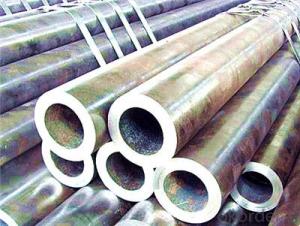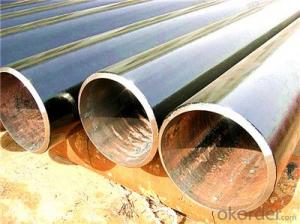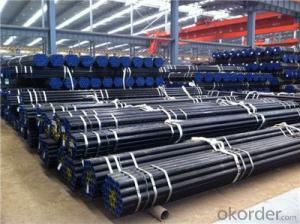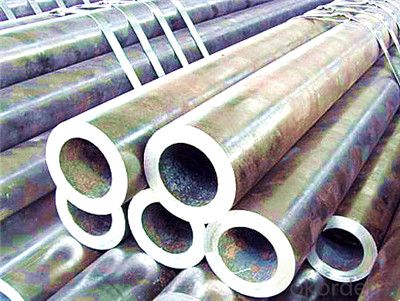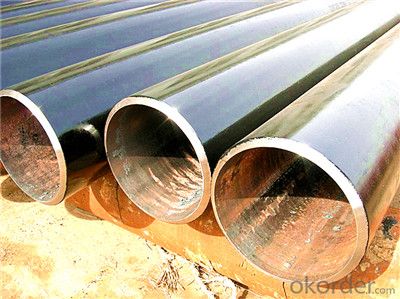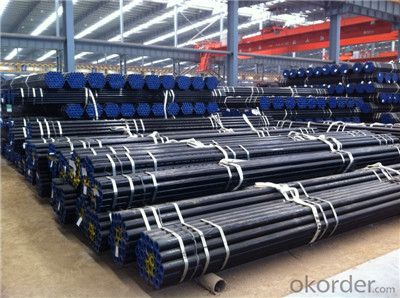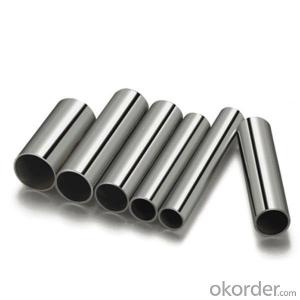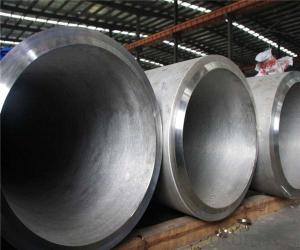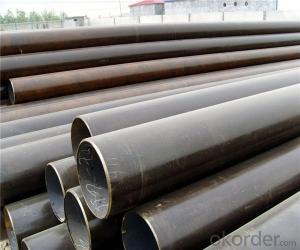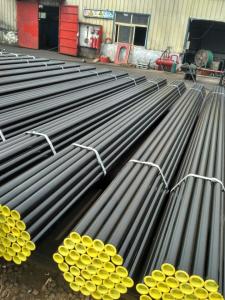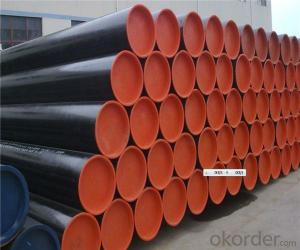CNBM seamless steel pipe with high quality and best price
- Loading Port:
- Tianjin
- Payment Terms:
- TT OR LC
- Min Order Qty:
- 50 m
- Supply Capability:
- 200000 m/month
OKorder Service Pledge
OKorder Financial Service
You Might Also Like
PRODUCT DETAILS
1.Structure of Seamless Steel Pipe Description:
A large amount of Seamless Steel Pipes is offered to the clients at cost effective rates. These pipes are extremely durable, resistant to corrosion and have high tensile strength. Our pipes are used in nuclear plants, power plants, refineries and construction industry across the country. Furthermore, we are capable of providing these seamless pipes to the clients in bulk quantity.
2.Main Features of the Steel Pipe:
• High manufacturing accuracy
• High strength
• Small inertia resistance
• Strong heat dissipation ability
• Good visual effect
•Reasonable price
3.Packaging & Delivery:
| Packaging Details: | Seaworthy packages, bundles wrapped with strong steel strip |
| Delivery Detail: | 15-30 days after received 30% TT |
4.Seamless Steel Pipe Specification:
| Standard: | GB, DIN, ASTM,ASME, ASTM A106-2006, ASTM A53-2007 |
| Grade: | 10#,20#, 45#, 16Mn |
Thickness: | 8 - 33 mm |
| Section Shape: | Round |
| Outer Diameter: | 133 - 219 mm |
| Place of Origin: | Shandong, China (Mainland) |
| Secondary Or Not: | Non-secondary |
| Application: | Hydraulic Pipe |
| Technique: | Cold Drawn |
| Certification: | API |
| Surface Treatment: | factory state or painted black |
| Special Pipe: | API Pipe |
| Alloy Or Not: | Non-alloy |
| Length: | 5-12M |
| Outer Diameter: | 21.3-610mm |
5.Product pictures
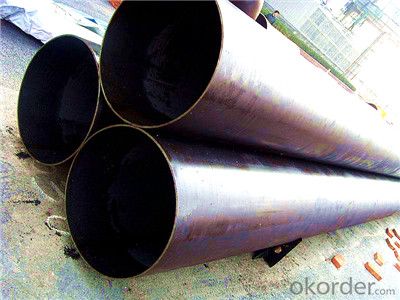
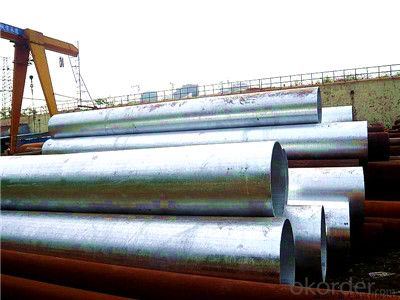
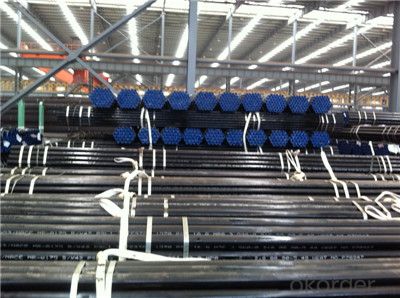
6.FAQ of Seamless steel pipe:
①How is the quality of your products?
Our products are manufactured strictly according to national and internaional standard, and we take a test
on every pipe before delivered out. If you want see our quality certifications and all kinds of testing report, please just ask us for it.
Guaranteed: If products’ quality don’t accord to discription as we give or the promise before you place order, we promise 100% refund.
②How about price?
Yes, we are factory and be able to give you lowest price below market one, and we have a policy that “ for saving time and absolutely honest business attitude, we quote as lowest as possible for any customer, and discount can be given according to quantity”,if you like bargain and factory price is not low enough as you think, just don’t waste your time.Please trust the quotation we would give you, it is professional one.
③Why should you chose us?
Chose happens because of quality, then price, We can give you both.Additionally, we can also offer professional products inquiry, products knowledge train(for agents), smooth goods delivery, exellent customer solution proposals.Our service formula: good quality+good price+good service=customer’s trust.
SGS test is available, customer inspection before shipping is welcome, third party inspection is no problem.
Any question, pls feel free to contact us !
- Q: How do you prevent freezing in steel pipes during cold weather?
- To prevent freezing in steel pipes during cold weather, there are several measures that can be taken: 1. Insulate the pipes: Insulation is an effective way to protect steel pipes from freezing. Use insulation sleeves or wraps to cover the pipes, especially in areas where they are exposed to cold temperatures. Insulation helps retain heat and prevents the pipes from reaching freezing temperatures. 2. Seal any air leaks: Check for any gaps or openings around the pipes where cold air can enter. Use caulking or weatherstripping to seal these gaps and prevent cold air from reaching the pipes. 3. Maintain a consistent temperature: Ensure that the area where the pipes are located is adequately heated and insulated. Keeping the temperature above freezing will help prevent the pipes from freezing. If the pipes are exposed to extremely low temperatures, consider using heat tape or pipe heating cables to provide additional warmth. 4. Allow water to flow: Running a small, continuous trickle of water through the pipes can help prevent freezing. The flowing water generates heat and inhibits the formation of ice within the pipes. However, this method should only be used as a last resort, as it can waste water. 5. Drain the pipes: If the steel pipes are in an area that is not regularly used or if freezing weather is expected, it may be advisable to drain the pipes completely. Turn off the water supply and open all faucets to allow the water to drain out. This eliminates any standing water that could freeze and cause the pipes to burst. It is important to note that prevention is key, as frozen steel pipes can lead to costly damages and water leaks. By implementing these measures, you can protect your steel pipes and ensure they remain functional during cold weather.
- Q: Can steel pipes be used for underground applications?
- Yes, steel pipes can be used for underground applications. They are commonly used for various purposes such as water and sewage systems, natural gas and oil pipelines, and underground infrastructure projects. Steel pipes are durable, strong, and resistant to corrosion, making them suitable for underground environments.
- Q: What is the difference between steel pipe and tubing?
- The main difference between steel pipe and tubing lies in their shape and size. Steel pipe is typically cylindrical in shape and has a larger diameter compared to tubing, which is generally produced in a variety of shapes, including round, square, and rectangular, with smaller diameters. Additionally, steel pipe is commonly used for transporting fluids and gases, while tubing is often utilized for structural applications or as components in mechanical systems.
- Q: How are steel pipes connected or joined together?
- Steel pipes are typically connected or joined together using various methods such as welding, threading, flanges, or couplings.
- Q: What are the different types of steel pipe hangers?
- In various industries and applications, steel pipe hangers are widely used to support and secure pipes, ensuring proper alignment and preventing sagging or movement. Let's explore some of the different types of hangers available: 1. Clevis Hangers: These hangers consist of a U-shaped metal bracket called a clevis, which is connected to the supporting structure using a threaded rod. Clevis hangers allow for vertical adjustment and are commonly used in suspended piping systems. 2. Split Ring Hangers: Circular metal rings that are split on one side, split ring hangers can be easily opened and closed around the pipe to provide a secure hold. They are often used for suspending horizontal pipes. 3. Beam Clamps: Beam clamps are designed to attach to structural beams or channels, offering a secure mounting point for pipe hangers. They come in various designs, such as top flange, bottom flange, and side mount, to accommodate different installation needs. 4. Swivel Hangers: Used for supporting pipes that undergo thermal expansion or contraction, swivel hangers allow horizontal movement while still providing support and preventing excessive stress on connections. 5. Riser Clamps: Riser clamps are used to support vertical pipes or risers. Typically consisting of a metal band that wraps around the pipe and a threaded rod connecting it to the supporting structure. 6. Pipe Roller Supports: Pipe roller supports are utilized when pipes need to move horizontally due to expansion or contraction. These hangers consist of a series of rollers that allow the pipe to move freely while still providing support. 7. Pipe Saddles: Pipe saddles are U-shaped brackets that wrap around the pipe, providing support on both sides. They are often used to secure pipes to walls or other structures. These examples showcase the variety of steel pipe hangers available. Selecting the appropriate hanger for each application is crucial, taking into account factors such as pipe size, weight, location, and required movement allowance. This ensures proper support and functionality of the piping system.
- Q: Are steel pipes suitable for high-temperature applications?
- Yes, steel pipes are suitable for high-temperature applications. Steel has excellent thermal conductivity and can withstand high temperatures without losing its structural integrity. Additionally, steel pipes have high tensile strength and can resist thermal expansion and contraction, making them ideal for transporting hot liquids or gases in industrial processes.
- Q: How are steel pipes used in the manufacturing of boilers?
- Steel pipes are an integral component in the manufacturing of boilers due to their strength, durability, and heat-resistant properties. Boilers are used to generate steam or heat water for various industrial and commercial applications. Steel pipes are primarily used in the construction of boiler tubes, which serve as the main heat transfer medium. These tubes are subjected to high temperatures and pressure, making it crucial to use a material that can withstand these extreme conditions. Steel, with its excellent mechanical properties and resistance to corrosion, is the ideal material for this purpose. The manufacturing process of boilers involves forming the steel pipes into specific shapes and sizes to create the boiler tubes. These tubes are then connected to form a network of channels through which hot gases or water flow. The steel pipes used in this process are often seamless or welded, depending on the requirements of the boiler design. The steel pipes used in boilers must meet stringent quality standards to ensure the safety and efficiency of the system. They are tested for their ability to withstand high pressure, temperature, and corrosion. Additionally, they undergo various inspections and tests, such as ultrasonic testing and radiographic examination, to detect any defects or flaws that could compromise the boiler's performance. In summary, steel pipes play a crucial role in the manufacturing of boilers by serving as the primary material for boiler tubes. Their strength, durability, and heat-resistant properties make them suitable for withstanding high temperatures and pressure. These pipes undergo rigorous testing to ensure their quality and reliability in creating efficient and safe boiler systems.
- Q: What are the different types of coatings used for internal lining of steel pipes?
- There are several types of coatings commonly used for the internal lining of steel pipes, including epoxy coatings, polyurethane coatings, and cement mortar linings. These coatings are applied to protect the steel pipes from corrosion, improve the flow of fluids, and enhance the longevity and durability of the pipes.
- Q: Are steel pipes suitable for underground nuclear waste storage?
- Underground nuclear waste storage does not lend itself to the use of steel pipes due to their unsuitability. Despite their strength and durability, steel pipes are susceptible to corrosion when in contact with certain forms of nuclear waste. As time passes, the radioactive elements can corrode the steel pipes, potentially leading to leaks and the contamination of the surrounding environment. Furthermore, steel pipes lack the necessary design to endure the extreme temperatures and pressures commonly found in nuclear waste storage facilities. Consequently, alternative materials like corrosion-resistant alloys or concrete are generally employed for underground nuclear waste storage to guarantee the confinement and isolation of hazardous substances.
- Q: What are the different types of steel pipes?
- There are several different types of steel pipes, including carbon steel pipes, stainless steel pipes, alloy steel pipes, and galvanized steel pipes. Carbon steel pipes are the most common type and are used for a wide range of applications. Stainless steel pipes are corrosion-resistant and often used in industries where hygiene is important. Alloy steel pipes are made from a combination of different metals to enhance their strength and durability. Galvanized steel pipes are coated with a layer of zinc to prevent corrosion and are commonly used in outdoor and marine applications.
Send your message to us
CNBM seamless steel pipe with high quality and best price
- Loading Port:
- Tianjin
- Payment Terms:
- TT OR LC
- Min Order Qty:
- 50 m
- Supply Capability:
- 200000 m/month
OKorder Service Pledge
OKorder Financial Service
Similar products
Hot products
Hot Searches
Related keywords
